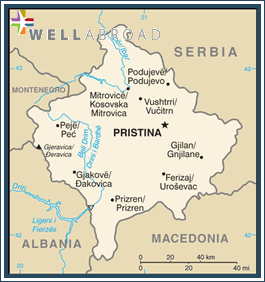|
MOST RECENT ALERTS
There's no recent alert.
|

|
|||||||||||||||
| COUNTRY OVERVIEW | ||||||||||||||||
|---|---|---|---|---|---|---|---|---|---|---|---|---|---|---|---|---|
|
| COUNTRY GENERAL INFORMATION | |||||||
|---|---|---|---|---|---|---|---|
| Language: |
Albanian (official), Serbian (official), Bosnian, Turkish, Roma |
||||||
| Currency: | Euro (EUR) | ||||||
| Predominant Religions: |
Muslim, Serbian Orthodox, Roman Catholic |
||||||
| National Holidays: | Independence Day, 17 February (2008) | ||||||
| Economic Status: |
Over the past few years Kosovo's economy has shown significant progress in transitioning to a market-based system, but it is still highly dependent on the international community and the diaspora for financial and technical assistance. Remittances from the diaspora - located mainly in Germany and Switzerland - account for about 30% of GDP. Kosovo's citizens are the poorest in Europe with an average annual per capita income of only $1800 - about one-third the level of neighboring Albania. Unemployment - at more than 40% of the population - is a severe problem that encourages outward migration. |
||||||
| Security: | |||||||
| US Presence: |
U.S. Embassy in Pristina
Arberia/Dragodan, Nazim Hikmet 30 Pristina, Kosovo Telephone: + 383 38 59 59 3000 |
||||||
| Document Requirements: |
US citizens need a passport to enter Kosovo. No visa is required, but visitors may be required to produce documentation to demonstrate the purpose of their visit. Generally, visitors allowed to enter Kosovo will be permitted to stay for up to 90 days. Persons who wish to prolong their stay beyond 90 days will need to register at the Office for Registration of Foreigners, located in the Main Police Headquarters in Pristina. Travelers to Kosovo may also wish to visit the Kosovo Government Portal prior to departing. Entry to Serbia from Kosovo should not be attempted without an entry stamp from a Serbia border crossing post, other than those between Serbia and Kosovo. Serbia does not recognize entry stamps by Kosovo border authorities at Kosovo ports of entry, including Pristina Airport, as valid. The US Department of State is unaware of any HIV/AIDS entry restrictions for visitors to or foreign residents of Kosovo. Information about dual nationality or the prevention of international child abduction can be found on our website. For further information about customs regulations, please read our Customs Information page. |
||||||
| Major Airports: |
Airports: 10, Airports w/paved runways: 6 |
||||||
| Servicing Airlines: |
|
||||||
| Risks and Precautions: |
The NATO-led Kosovo Force (KFOR) along with international and local police, are responsible for security and stability in Kosovo. Although the overall security situation has improved, inter-ethnic tensions and sporadic incidents of violence continue to occur. Following the February declaration of independence, violent incidents occurred at border crossings between the Republic of Kosovo and Serbia. Per standing security instructions, U.S. Government officials may only travel to parts of northern Kosovo for official business and these restrictions remain in place. CRIME: High unemployment and other economic factors have encouraged criminal activity. Street crimes, in particular theft and purse snatchings, are serious problems in Kosovo, especially Pristina. It is not unusual for criminals to commit crimes while armed, especially with handguns. Foreigners can be targets for crime, as they are assumed to carry cash. Likewise, foreigners’ homes, vehicles and international non-governmental organization (NGO) offices have been subject to burglaries. The loss or theft of a U.S. passport should be reported immediately to the nearest police station and to U.S. Embassy Pristina. While U.S. Embassy Pristina does not have the ability to issue new passports at this time, it will assist with arrangements for applying for a new passport at the U.S. Embassy in Skopje, Macedonia. Emergency numbers in Pristina are Police: 92; Fire Department: 93; and Ambulance: 94. For information on other areas contact U.S. Embassy Pristina. |
||||||
| Mortality Statistics: |
Infant MR total: 156.48 deaths/1,000 live births Life expectancy at birth: TOTAL 40.93 years (male 38.64/female 43.28) |
||||||
| Immunization Indicators: |
Required: None Recommended: Hep A & B, Typhoid |
||||||
| Infectious Disease Concerns: |
Tickborne encephalitis (TBE) is widespread, occurring in warmer months in the southern part of the nontropical forested regions of Europe and Asia. Most intense transmission has been reported in Russia, the Czech Republic, Latvia, Lithuania, Estonia, Hungary, Poland, and Slovenia. The annual incidence rate of tuberculosis is high in some countries in the region. High rates of drug-resistant TB are found in Estonia, Kazakhstan, Latvia, Lithuania, parts of Russia, and Uzbekistan. Cases of diphtheria have declined (after a large outbreak in the 1990s) with improved rates of immunization. |
||||||
| Overall Quality of Medical Services: |
Health facilities are limited, and medications are in short supply. KFOR cannot provide basic health care to non-military personnel, nor can they provide medical evacuation out of Kosovo. |
||||||
| Providers in Network: |
|
||||||
| Recent Medical Threats/ Concerns/Warnings: |
Highly pathogenic avian influenza virus H5N1 has been documented in wild birds or other avian species in several of the countries in Eastern Europe. Human cases and death were reported from Azerbaijan in 2006. Avoid all direct contact with birds, including domestic poultry (such as chickens and ducks) and wild birds and avoid places such as poultry farms and bird markets where live birds are raised or kept. For a current list of countries reporting outbreaks of H5N1 among poultry and/or wild birds, view updates from the World Organization for Animal Health (OIE), and for total numbers of confirmed human cases of H5N1 virus by country, see the World Health Organization (WHO) Avian Influenze website. |
||||||
| Communications Info: | |||||||






